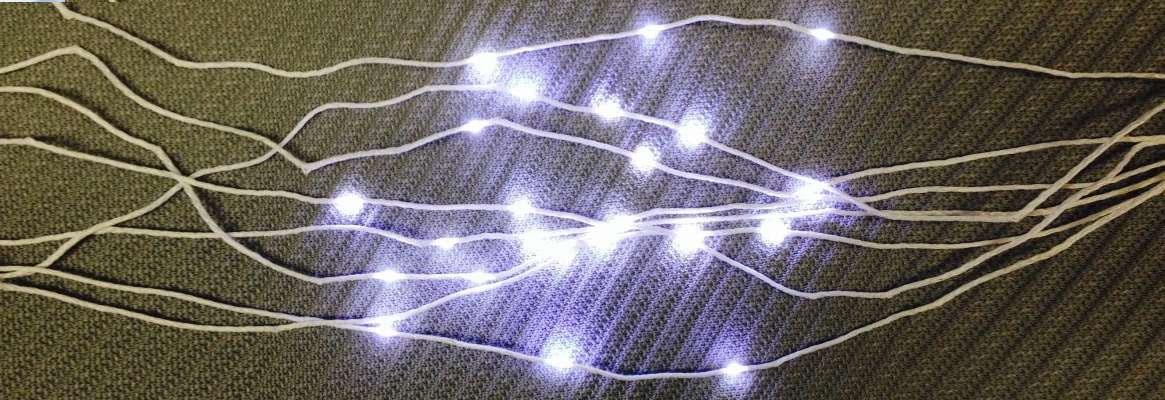Clothing is one of the three basic needs of humans. Since the primitive age, man has been using textile for clothing in the forms of sailcloth, tent, ropes and other protective garments. However, back then textile was used only for technical performance. Today, technology has become so advanced and adaptive that there are materials that sense and react accordingly to changes in environmental conditions or external stimuli, including thermal, mechanical, electrical and magnetic.
Introduction of smart textile is the era in technology that is still unexplored and for some, a new way to live their science-fiction fantasies. Smart textiles are fabrics that are designed to include technologies that offer the wearer with increased functionality. Increase in the standard of living, awareness of safety and environmentalism, and an expanding automotive sector have boosted the growth of the smart textile market. According to research firm Allied Market Research, the global smart textile market is expected to reach $5,369 million by 2022, at a compound annual growth rate of 28.4 per cent from 2016 to 2022.
Graphene: wonder material in smart textile industry
In the quest to create mass-produced, affordable and durable smart textiles, graphene has become a wonder material. Currently, wearable electronics are achieved by gluing electronic components, which usually leads to malfunctioning. However, a recently published research offers a novel way by integrating the electronic devices into the fabric itself. A team of scientists lead by Monica Craciun from the University of Exeter in the United Kingdom have presented an innovative way to create electronic fibres that can be incorporated into the manufacturing of everyday clothing.
The team used graphene to integrate electronic devices into the fabric by coating electronic fibres with only lightweight and durable components that could allow images on the fabric. According to the research team, this discovery could revolutionise use of wearable electronic devices in monitoring health parameters like heart rate and blood pressure.
At the scale of an atom, graphene is considered as the thinnest substance that is capable of conducting electricity. Moreover, graphene is flexible as well as the strongest material known. The research used existing polypropylene fibres, which are used in commercial applications in the textile industry to attach graphene-based electronic fibres to create light-emitting and touch-sensor devices without any need of electrodes or wires.
Smart textile to deliver medications
Technological innovations in the textile industry have been aiming at improving the quality of human lives. A textile startup, TexDel, has recently created a smart textile using nylon and polyester that can deliver the active ingredients into the wearer's body.
TexDel founder Jordan Schindler developed a brand of wool socks and has launched the world's first anti-pain medication sock. They are named Kentwool SensationWool and are
developed for those who need temporary relief from muscle and joint pain or suffer from sprains, bruises, cramps or pain. These are made with capsaicin-infused yarn and ultra-fine merino wool using the company's self-developed Nufabrx technology. The technology incorporates fibre-active ingredients that are programmed for effective, predictable, effective, washable and durable release. However, the major ingredient is capsaicin, which is regarded as a topical analgesic.
Recently, the company was awarded $1 million from Advanced Functional Fabrics of America (AFFOA), a private-public partnership led by the Massachusetts Institute of Technology. The award supports the manufacturing scale if TexDel's technology is for controlled delivery of ingredients via textile.
Clothes that track heart rate
UK-based smart textile company Kymira has launched a prototype of T-shirts that can monitor the wearer's heart rate to help lower the risk of heart attacks among athletes. The firm developed athleisure that wirelessly transmits a wearer's heart rate to a smartphone using Bluetooth and can detect irregular heart rhythm that may lead to a cardiac arrest.
These clothes are designed such that the electrodes are printed onto the T-shirt's sleeves fabric feed and the processing unit transmits the ECG data to the smartphone. The company has developed an algorithm that processes the data and filters out the noise to detect unusual heartbeats. Kymira expects the athleisure line to hit shelves by the end of 2020.
Kymira CEO and founder Tim Brownstone stated: "We hope that this product would be used for clinical purposes to help those who suffer from a chronic heart condition and warn them about possible cardiac arrest." Apart from ECG, the sportswear also helps maintain body temperature to enhance the athlete's performance. Using minerals that are embedded into the fabric, energy is produced by the body during exercise, which re-emit themselves as infrared energy into muscles. As per Kymira, this process raises tissue oxygen level by about 20 per cent and helps ease the pain to reduce post-exercise muscle soreness.
The 21st century is full of novel innovations to improve human lifestyle and the development of woven fabrics integrated with technology would bring in a revolution in the textile industry. In fact, don't be shocked if in future your hand gloves heat up in cold by simple commands or clothes change colours according to the beats of the music while dancing.



_Small.jpg)



